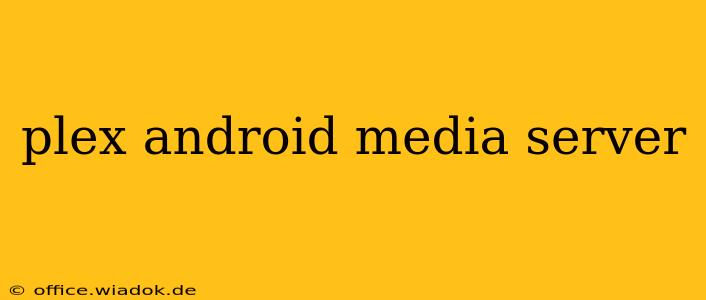Plex is a popular media server solution allowing users to stream their personal media libraries to various devices. While often associated with dedicated hardware or a PC, Plex also offers an Android app that functions as a media server. This guide delves into the capabilities, benefits, and limitations of using your Android device as a Plex Media Server.
Understanding Plex Media Server on Android
Using your Android device as a Plex Media Server offers a unique approach to media management. Unlike a traditional server setup, using an Android device provides portability and convenience. However, it’s crucial to understand its limitations. This method is best suited for smaller libraries and situations where a dedicated server isn't feasible. Expect performance to be significantly affected by the device's processing power, storage capacity, and overall system load.
Key Features and Functionality:
- Local Media Streaming: Stream your movies, TV shows, music, and photos stored on your Android device to other Plex clients.
- Portability: Take your server wherever you go, provided your Android device has a reliable internet connection.
- Remote Access: Access your media library from anywhere with an internet connection, subject to the capabilities of your Android device.
- Simple Setup: The Plex app on Android simplifies the setup process, generally making it easier than configuring a PC-based server.
- Limited Transcoding: Transcoding capabilities are significantly limited compared to a dedicated server. You’ll likely experience better performance when streaming to devices compatible with your media files' codecs.
Benefits of Using an Android Device as a Plex Server:
- Simplicity: The setup is relatively straightforward, making it ideal for users less comfortable with complex server configurations.
- Portability: This is a major advantage. You can easily move your media server, making it a perfect solution for travel or temporary setups.
- Cost-Effectiveness: You can leverage existing hardware (your Android device), eliminating the need for additional purchases.
Limitations and Considerations:
- Resource Intensive: Running a Plex Media Server on an Android device can heavily tax its resources, potentially impacting the device's performance and battery life.
- Storage Capacity: The storage space on your Android device directly limits the size of your media library. Consider using external storage (like an SD card) but be mindful of read/write speeds.
- Processing Power: An Android device's processor might struggle to transcode high-resolution videos, resulting in slow streaming or buffering issues. Expect limitations in simultaneous streaming to multiple clients.
- Heat Generation: Prolonged server operation can cause your device to overheat, potentially affecting performance and battery health.
- Network Dependence: Reliable internet connectivity is crucial for remote access to your media library.
Choosing the Right Android Device
Not all Android devices are created equal. When selecting a device to use as a Plex Media Server, consider the following:
- Processor: A powerful processor with multiple cores is essential for smoother transcoding and streaming.
- RAM: Sufficient RAM is vital for handling multiple tasks simultaneously. Aim for at least 4GB, but more is preferable.
- Storage: Choose a device with ample internal storage or the ability to expand storage via an SD card. The storage space directly impacts the size of your media library.
- Cooling: Devices with effective cooling systems will prevent overheating during prolonged use.
Optimizing Performance
To maximize the performance of your Plex Android Media Server, consider these steps:
- Wired Connection: Use a wired Ethernet connection instead of Wi-Fi for more stable streaming.
- Background Processes: Close unnecessary apps and processes running in the background to free up system resources.
- Media Optimization: Convert your media files to codecs compatible with your target streaming devices to reduce transcoding load.
- Regular Maintenance: Keep your Android device’s software updated and perform regular maintenance to ensure optimal performance.
Conclusion
While using your Android device as a Plex Media Server offers convenience and portability, it's crucial to understand its limitations. It's a viable option for smaller media libraries and users prioritizing mobility. However, for larger libraries and demanding streaming needs, a dedicated media server (PC, NAS, or other dedicated hardware) remains the more robust and efficient solution. Carefully weigh the pros and cons based on your specific needs and expectations.

